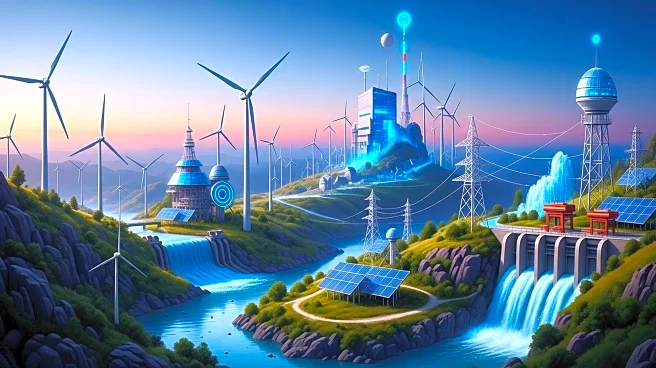What's Happening?
The International Renewable Energy Agency (IRENA) has released a report indicating that women hold 32% of full-time jobs in the renewable energy sector, a figure unchanged since the agency's first gender analysis in 2019. The report, titled 'Renewable Energy: A Gender Perspective,' highlights the lack of progress in women's representation in the industry, despite their better representation compared to fossil fuel sectors. Women are significantly underrepresented in senior leadership roles, accounting for only 19% of such positions, while they make up 45% of administrative roles. In STEM-related positions, women's representation drops to 28%, and it is lowest in trades such as installers and electricians, at 22%. The report calls for targeted policy interventions and collaboration among stakeholders to address these disparities.
Why It's Important?
The stagnation in women's representation in the renewable energy workforce is significant as it highlights systemic barriers that hinder gender equality in a sector crucial for sustainable development. Without greater gender equality, the energy transition may face challenges such as labor shortages and a lack of diverse perspectives, which are essential for innovation and effective problem-solving. Women, often primary users and managers of household energy systems, are crucial to achieving universal energy access, a key United Nations sustainable development goal. The report emphasizes the need for governments and organizations to enforce non-discrimination laws, promote equal pay, and provide access to education to ensure a fair and sustainable energy transition.
What's Next?
IRENA's report suggests that overcoming barriers to gender equality in the renewable energy sector requires both top-down and bottom-up strategies. Governments are urged to embed gender equality into climate and energy policies, while employers should introduce flexible work arrangements and transparent recruitment practices. Educational institutions, trade unions, and civil society organizations have roles in dismantling stereotypes and expanding opportunities for women. The report warns that without these measures, the energy transition will not be fair or sustainable, highlighting the need for immediate action to recognize women as equal partners and leaders in shaping the future of renewable energy.
Beyond the Headlines
The report sheds light on the cultural and systemic biases that women face in the renewable energy sector, which persist at every stage of professional development. These include challenges in balancing professional and caregiving responsibilities and confronting discriminatory practices that hinder advancement into leadership positions. The disparities in female representation among different types of organizations, with private enterprises showing the lowest levels, underscore the need for a comprehensive approach to gender equality that involves all stakeholders.










